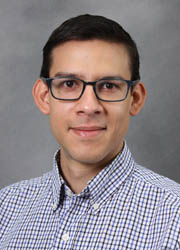Past Event: Oden Institute Seminar
Adrian Buganza Tepole, Associate Professor, Purdue University
3:30 – 5PM
Tuesday Sep 17, 2024
POB 6.304 and Zoom
The recent explosion in machine learning (ML) and artificial intelligence (AI) algorithms has started a revolution in many engineering fields, including computational biophysics. This talk focuses on our recent efforts to leverage and develop ML methods to model and increase our fundamental understanding of various tissues but in particular skin and its unique ability to adapt to mechanical cues. I will first cover our work on data-driven constitutive modeling. We use neural ordinary differential equations (NODE) to build material models for hyperelasticity, viscoelasticity, and damage mechanics. The NODE framework enables satisfaction of physics constraints such as polyconvexity and positive energy dissipation, which make the method robust against noise and suitable for extrapolation, all while outperforming traditional modeling frameworks. I will also describe application to clinical settings, in particular skin growth in tissue expansion, a popular reconstructive surgery technique that grows new skin in response to sustained supra-physiological loading. We have created computational models that combine mechanics and mechanobiology to describe the deformation and growth of expanded skin. Leveraging ML tools such as multi-fidelity Gaussian processes, we have performed Bayesian inference to learn mechanistically how skin grows in response to stretch and applied these tools to patient-specific modeling.
Dr. Buganza-Tepole is an Associate Professor of Mechanical Engineering and Biomedical Engineering (courtesy) at Purdue University. He obtained his Ph.D. in Mechanical Engineering from Stanford University in 2015 and was a postdoctoral fellow at Harvard University before joining Purdue as a faculty member in 2016. He was also a Miller Visiting Professor at UC Berkeley during Spring 2022 and is currently a Harrington Faculty Fellow at The University of Texas at Austin. His group studies the interplay between mechanics and mechanobiology of biological tissues. Using computational simulation, machine learning, and experimentation, his group seeks to characterize the multi-scale mechanics of soft materials and living tissues to understand the fundamental mechanisms of mechano-adaptation in order to improve clinical diagnostics and interventional tools.
